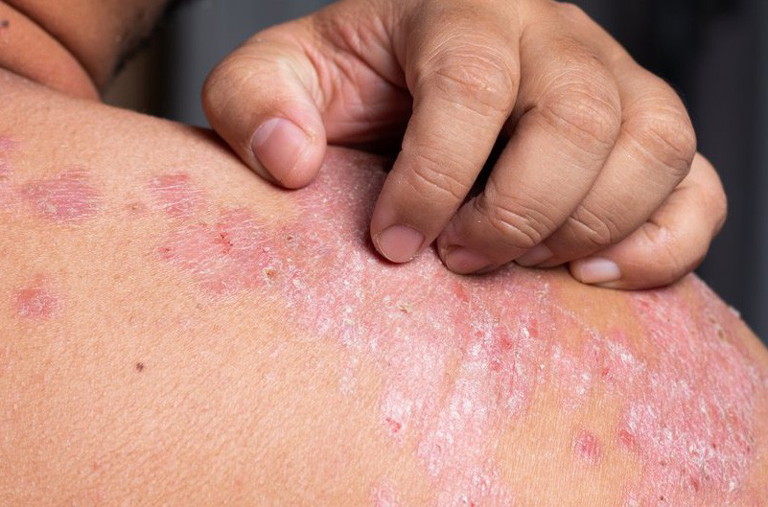INFLAMMATORY SKIN DISEASES
“The pain keeps me awake at night. I can’t cope with this anymore”
The therapeutic agents of the past decade have revolutionised dermatological treatments, improving the quality of life of patients with psoriasis. Dr Susanne Farwer at UCB shares her extensive clinical experience in the area
Pharmafile: What have been the most significant advancements in dermatology and psoriasis management over the past decade?
Dr Susanne Farwer: The past decade of dermatology has seen the development and launch of novel therapeutic agents with differentiated modes of action, enabling more targeted treatment approaches with a range of effective and well-tolerated therapies. The introduction of these therapies revolutionised dermatology and I have been very privileged to witness first-hand how these drugs have transformed the lives of patients living with chronic inflammatory dermatoses, such as psoriasis or atopic dermatitis.
Despite these scientific advancements, psoriasis remains a challenge to treat, with a substantial proportion of patients not achieving optimal disease control with the current therapeutic options.
My clinical years exposed me to countless patients desperately seeking that ‘magic pill’, with hopes and expectations for a treatment that will relieve them of the disease burden they have been carrying both mentally and physically. It is these experiences which inspire my passion for improving patient outcomes, and I am excited to be working at the forefront of these advancements.

What challenges and barriers still exist and prevent patients from reaching their treatment goals and living their lives to the fullest?
More than 50% of the UK population are affected by skin disease at some point in their lifetime, with over 13 million people (24%) visiting their GP with a skin condition.1 In comparison to other chronic conditions such as diabetes, chronic obstructive pulmonary disease (COPD) or cardiovascular disease, dermatological conditions still rank low on the government and health policy makers’ agenda.
The high disease burden and wide-ranging impact of psoriasis on people’s daily lives is still underestimated. Furthermore, the high prevalence of co-morbidities affecting joints, psychosocial well-being, and the metabolic system, are often not well understood or acknowledged across the various stakeholders in the healthcare system. Reports show that nearly 60% of people with psoriasis say the disease causes problems in their everyday lives.2 What vividly remains in my memory are the many patient struggles I heard during my clinical years.
Patients consistently report a lack of understanding and awareness of the treatment options available to them, and so they fail to understand what they can and should expect from their treatment. This therefore limits their influence in shared decision making about their treatment pathway, in partnership with their dermatologist.
“ My skin looks like a mess and people are staring at me; I am itching all over, and the pain keeps me awake at night. I can’t cope with this anymore, I don’t think anyone will ever find me attractive being covered in all these red patches from top to toe. I’ve not worn a sleeveless top in years and have lost all my confidence showing off my skin ”
anonymous patient, aged 35, from South Yorkshire.
Currently, the system isn’t working well enough for people with psoriasis, so we are dedicated to working with healthcare professionals and the NHS to find new ways to overcome the systemic challenges that stand between people with skin diseases and access to innovative treatments, and holistic, integrated patient care.
How is UCB Pharma challenging the status quo and how do you hope to impact the space going forward?
Collaboration is fundamental to delivering transformative solutions to those who need it. While those involved in dermatology – patients, clinicians, payors, patient groups, or the scientists working to unlock the treatments of the future – face different challenges, ultimately, we are all working towards the same goal.
This goal is to ensure better lives for those living with skin disease, and faster access to innovative treatments. By working together as partners, we believe we can significantly reduce the time from diagnosis to effective treatment and ultimately, find ways for everyone to feel comfortable in their own skin and live fulfilled lives, free of physical and emotional burden.
We aim to not just listen to stakeholders and gather their insights, but to also involve them in the co-creation of insightdriven solutions. The recent pan-European EPICENSUS Project showcases our collaborative approach to improving outcomes for people living with psoriasis.3 Initiated in December 2020 by UCB, this integrated consensus programme involves key stakeholders (clinicians, payors and patient advocacy groups representatives) from across eight European countries, and focuses on generating engagement, gathering insights and enabling a multidisciplinary conversation. It will critically evaluate the current standard of care with regards to diagnosis, monitoring, access, and patient-reported outcomes in psoriasis, with results due to be published later this year. We hope that EPICENSUS will ultimately deliver a paradigm shift in outcomes for people with psoriasis, reducing the significant burden on the health care system and enhancing the delivery of future psoriasis care.
How will new technology such as machine learning and AI influence the dermatology space in the coming years?
New technologies such as machine learning have been successful in predicting the trajectory of patients’ health in various fields such as cancer, diabetic complications, and cardiovascular mortality. Recent studies have shown that although ample data exists on the efficacy of biologics in psoriasis, decision making on treatments is still often based on a trial-and-error approach. In a real-world setting, over 50% of patients required dose adjustment during therapy and 20-50% of patients experienced a relapse, resulting in a switch to another medication.4
The application of such modelling algorithm methods for psoriasis treatment could help to predict long-term responses to biologics. Combining patient variables such as demographic data with disease and therapy specifics has shown promising results in this space.
To make the use of these impressive technologies a common practice, further studies and analyses on a larger and more diverse dataset are needed to identify universally applicable criteria.
What further advancements are needed in the dermatology space to achieve better health outcomes for patients, and enable an improved patient experience?
The introduction of integrated care systems (ICSs) provides an opportunity to acknowledge the impact of skin conditions on wider society and the healthcare system. It is important that these ICSs are gathering these insights and using them to implement decisions that strive towards integrated approaches to care.
It is also important that we are leveraging the range of data and the latest innovations in digital technologies to accelerate the identification of genetic, tissue and serum markers, to better predict treatment response and drug survival. This will help to optimise datadriven decision-making to personalise treatment and ultimately improve patient outcomes.
Above all, we won’t stop searching for the best solutions so that everyone has the opportunity to feel completely comfortable in their own skin, to leave the burden of skin disease behind, and to lead a healthy and happy life free of embarrassment, stigma, and judgement.
References
- Visit: www.abpi.org.uk/media/4684/der-0080-0517-dermatology_initiative_report_rev16.pdf
- Visit: www.mg217.com/your-psoriasis/statistics-aboutpsoriasis
- Visit: www.ucb.com/patients/magazine/detail/article/Our-Commitment-to-Changing-the-Status-Quo-in-Psoriasis-Care
- Emam S et al, Predicting the long-term outcomes of biologics in patients with psoriasis using machine learning, Br J Dermatol 182(5): pp1,305-1,307, 2019

Dr Susanne Farwer joined UCB in August 2020 as the Medical Solutions Lead for Dermatology in the UK and Ireland. Prior to this move, she spent over 20 years as a healthcare professional including time as a GP and a Specialty and Associate Specialist (SAS) doctor in dermatology for the NHS.
Susanne’s extensive clinical experience combined with her deep passion for advancing and implementing solutions that reduce the disease burden and improve patients’ quality of life, makes her an asset to UCB whose own philosophies include bringing innovative therapies to those with severe chronic diseases.
On a personal level, Susanne prides herself on being adaptable, determined, and inspiring those around her, all while having a great sense of humour.